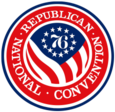1976 Republican National Convention
1976 presidential election
|
|
 
Nominees
Ford and Dole |
|
| Convention | |
|---|---|
| Date(s) | August 16–19, 1976 |
| City | Kansas City, Missouri |
| Venue | Kemper Arena |
| Candidates | |
| Presidential nominee | Gerald Ford of Michigan |
| Vice Presidential nominee | Bob Dole of Kansas |
The 1976 Republican National Convention was a United States political convention of the Republican Party that met from August 16 to August 19, 1976, to select the party's nominee for President. Held in Kemper Arena in Kansas City, Missouri, the convention nominated President Gerald Ford for a full term, but only after narrowly defeating a strong challenge from former California Governor Ronald Reagan. The convention also nominated Senator Robert J. Dole of Kansas for Vice President, instead of Vice President Nelson Rockefeller. The keynote address was delivered by Tennessee Senator Howard Baker. It is the last national convention by either of the two major parties to feature a seriously contested nomination between candidates.
The 1976 Republican National Convention was the last major party convention, as of 2016[update], where the party's nominee was not decided before the primary process concluded.
Going into the convention, Ford had won more primary delegates than Reagan, as well as a plurality in popular vote. However, Ford did not have enough to secure the nomination, and as the convention opened both candidates were seen as having a chance to win. Because of this, both Ford and Reagan arrived in Kansas City before the convention opened to woo the remaining uncommitted delegates in an effort to secure the nomination. Reagan benefited from his highly committed delegates, notably "Reagan's Raiders" of the Texas delegation. They and other conservative Western and Southern delegates particularly faulted the Ford Administration's foreign policy of détente towards the Soviet Union, criticizing his signing of the Helsinki Accords and indirectly blaming him for the April 1975 Fall of Saigon. The pro-Reagan Texas delegates worked hard to persuade delegates from other states to support Reagan. Ford, meanwhile, used all of the perks and patronage of the Presidency to win over wavering delegates, including trips aboard Air Force One and personal meetings with the President himself.
...
Wikipedia
